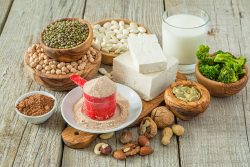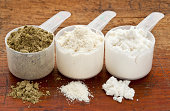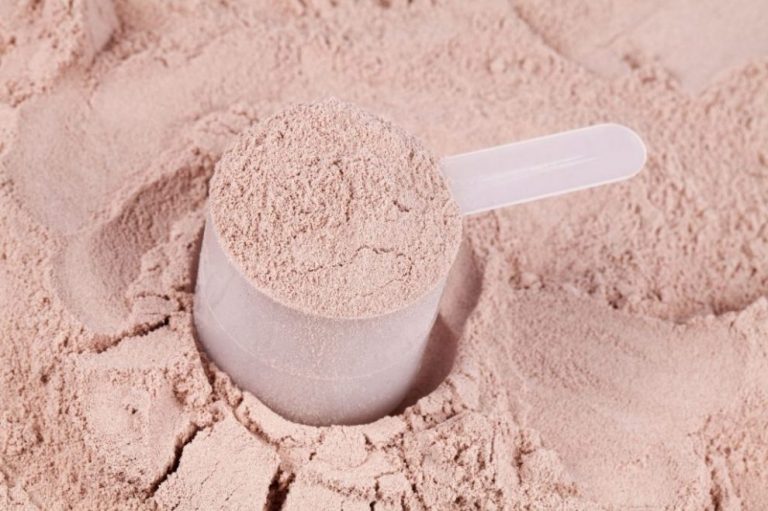What is protein and why should we ingest it?
Chemically, protein is composed of amino acids, which are organic compounds made of carbon, hydrogen, nitrogen, oxygen or sulfur. There are twenty amino acids in total, used to develop and maintain just about every part of the body, from our skin and hair to ourdigestive enzymes,muscle cells, hormones, immune cells and vital organs. Protein is a macronutrient and so important to take for energy. Furthermore protein is constantly being broken down for the numerous roles it has in the body it should be replaced daily. People who run on empty, i.e. train on an empty stomach may notice their energy drops and crave the unhealthy food that hinders weight loss attempts and training in the gym.

Having a protein deficiency in the diet can lead to the following symptoms to name but a few: weakness, muscle wasting, lowered concentration, constant hunger, imbalances in weight, and a lowered metabolism. Consuming protein is important for everyone, the elderly, those that are unwell and regardless if one exercises or not for repairing tissues and retaining muscle mass. Protein is commonly used in sports nutrition and body building due to its satiating effect, by keeping blood sugar levels stable as protein take longer to break down compared to carbohydrates. The amino acids in protein also replenish what’s been used up in training.
Sources of protein
Protein is found in various foods: Meat, poultry, seafood, beans and pulses, eggs, soy products, nuts seeds, some grains such as millet and quinoa and green vegetables! Sproutingnuts, legumes and grains helps make the amino acids more absorbable once eaten, thus increasing their overall nutritional value. Although green vegetables are not very abundant in protein gram for gram in comparison to meat foods, peas, kale, spinach and broccoli do contain amino acids that the body will utilise.

Supplementing extra protein with protein powders
Protein powders can be used to increase dietary protein, they are safe and tolerable by most. Examples of protein powders are below and these are used to make protein drinks or shakes by being mixed with dairy or non-dairy or water to make a protein shake. The protein powders already contain the free amino acids they are delivered into the muscles readily so can be consumed 40 to 60 minutes before a workout to fuel the muscle and delay muscle fatigue during training. When drunk immediately after a workout the amino acids replenish the protein broken down in the muscles during training. Protein shakes can also be drunk anytime in the day as a snack to keep blood sugar levels better controlled in between meals. The key with protein is variety and ensuring one gets dietary sources of protein which then can be supplemented with 1-3 servings of protein powder if required. If you crave protein then feed it protein.
 Check out Muscle Zone's variety of protein powders and supplements
Check out Muscle Zone's variety of protein powders and supplements
Whey protein and its isolates: by-product of the cheese-making process and widely found in tubs in health food stores and sports shops. Not suitablefor those on dairy free diets and sometimes causes difficulty in digestion. 30g serving provides approx. 26g of protein.
Brown rice protein:the best and tolerated by all even those following vegan diets. 30g serving provides approx. 22g of protein
Pea protein: suitable for all, great added to savoury dishes. 30g serving provides approx. 22g of protein.
Hemp protein:contains half the protein quantity compared to brown rice and whey. But can be used to boost protein.
Soya protein:based on the lack of long term research on its safety and GM concerns. I would opt for the above alternatives.
Incorporating nuts and seeds can also boost the protein content of meals. For example 30g of chia seeds provides approximately 5g of protein. An avocado can also contain 3-5 g of protein, not bad for a fruit. Spirulina which is a blue green algae contains an excellent spectrum of amino acids and 7g about a teaspoon provides 4g of protein. It is classed as super green food because its also abundant in iron, calcium, magnesium, potassium and B vitamins. Spirulina has been shown to lift fatigue, and stabilise appetite, thus a favourite with astronauts and athletes.
How much protein do we need?
For the average individual both UK and USA guidelines, postulate daily protein needs should be around 0.8-1g of protein per kg body weight. So for example an individual weighing 65kg needs 52-65g of protein daily. For those competing and training intensively in fitness and sports, even up to 6/7 days a week their protein needs will be higher in comparison to someone training a few times a week. To build muscle mass and stay in an anabolic phase higher protein is recommended as during exercise the body is in a catabolic state breaking down muscle tissue. So 2g of protein per body weight may be consumed. Therefore an individual weighing 165kg may need 300-330g of protein a day to replenish muscle stores. This can be divided up in the day into meals, snacks and protein shakes and for an elite athlete consuming 5000-6000 calories is expected due to their greater energy expenditure. The old school of thought for protein intake used to be protein at every meal however it is now thought that what matters is the total daily intake, and it doesn’t have to be consumed with every meal. This is reassuring for those concerned about meeting protein needs at every meal and also gives a place to protein shakes which can be used to boost the daily requirements. Meals should also be balanced with wholesome carbs, good fats and vegetables for overall health.
Article by Sonal Shah.Sonal is a nutritional therapist and director of Synergy Nutrition®.






